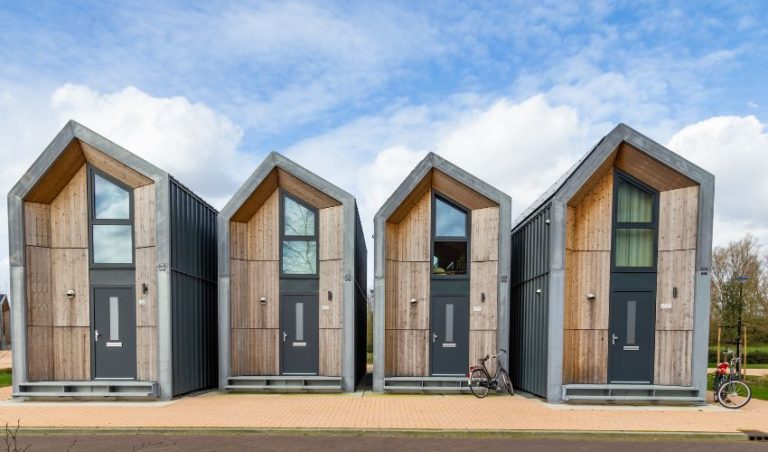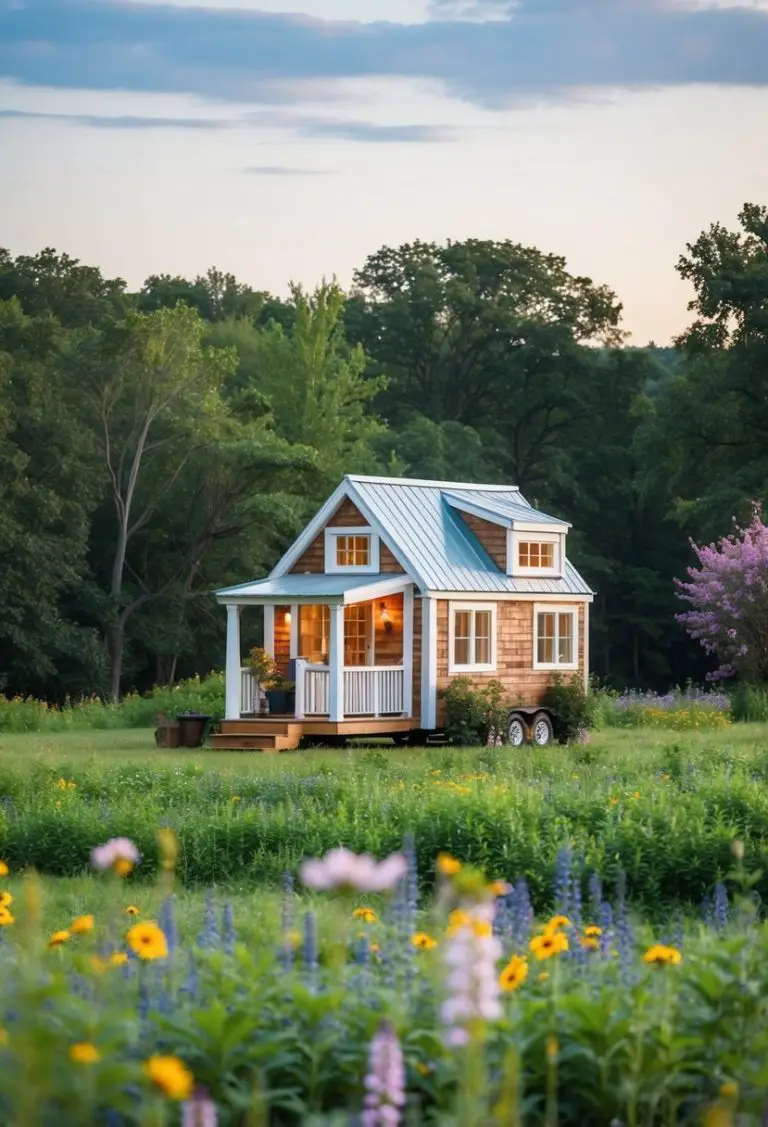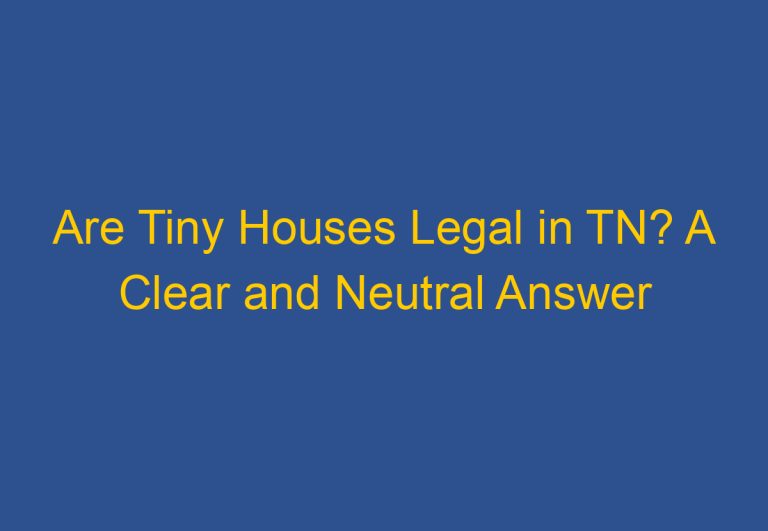Are Tiny Houses Legal in NC? A Comprehensive Guide to Tiny House Laws in North Carolina
Tiny houses have been growing in popularity across the United States, with many people opting for this minimalist lifestyle. However, many people are left wondering whether tiny houses are legal in North Carolina. The answer is yes, tiny houses are legal in North Carolina, but there are some regulations that need to be followed.
According to North Carolina’s tiny home rules and regulations, transitional structures range from 180 to 500 square feet, and monthly payments between $350 to $525 a month are required. The fee already includes utilities. Building laws for small homes in North Carolina must meet protection criteria, which include electricity, plumbing, insulation, and ventilation. Off-grid living rules, such as those governing solar panels and composting toilets, differ by county and city. Most counties define tiny dwellings as RVs, and living in RVs full-time is often prohibited.
It is important to note that while tiny houses are legal in North Carolina, living in one full-time may not be allowed in all counties. Some communities in North Carolina, especially Raleigh, have gone out of their way to provide clear, detailed resources on tiny house laws to those looking to embark on the tiny lifestyle. In addition, there are some proposed ordinances that aim to facilitate the creation of tiny houses in certain areas. Overall, it is important to research the specific regulations in your area before embarking on the tiny house lifestyle in North Carolina.
Legality and Zoning Laws
Statewide Regulations and Building Codes
In North Carolina, tiny houses are considered to be transitional structures and are subject to the state’s building codes and regulations. The state requires monthly payments between $350 to $525 a month for tiny houses that range from 180 to 500 square feet. The residential building code for tiny houses is based on the 2015 International Residential Code (IRC) and its Appendix Q, which is similar to the IRC but includes specific requirements for tiny houses. Appendix Q provides guidelines for designing and building tiny houses on foundations and on wheels.
Local Ordinances and Requirements
Local zoning laws and ordinances in North Carolina vary by city, county, and town. Some communities in North Carolina have embraced the tiny house movement and have adopted zoning laws and ordinances that allow for tiny houses as accessory dwelling units (ADUs) in residential areas. For example, Raleigh has passed an ordinance to facilitate the creation of tiny houses, while other cities like Asheville, Wilmington, Charlotte, Greensboro, and Winston-Salem have not yet adopted specific zoning laws for tiny houses.
Specific Considerations for Tiny Houses on Wheels
When it comes to tiny houses on wheels, North Carolina’s vehicle code considers them to be recreational vehicles (RVs). As such, tiny houses on wheels must comply with the state’s vehicle code, which includes requirements for brakes, lights, and other safety features. However, living in an RV full-time in North Carolina is often prohibited, and most counties define tiny dwellings as RVs. Therefore, it is important to check with your local zoning office to determine if living in a tiny house on wheels is allowed in your area.
In addition to complying with the state’s building codes and regulations, obtaining the necessary permits, and meeting local zoning requirements, tiny house owners in North Carolina must also consider other factors such as floor area, gross floor area, and habitable space. It is important to keep in mind that while tiny houses may offer an affordable and sustainable housing option, they are subject to the same legal and zoning requirements as traditional homes.
Building and Living in Tiny Houses
Construction and Foundation
When it comes to building a tiny house in North Carolina, there are certain guidelines and requirements that must be followed. The construction of a tiny house must meet safety standards, including proper foundation and materials. Tiny houses on foundations are considered permanent residences, and must meet the same requirements as any other primary residence.
Utility and Design Requirements
Utility requirements for tiny houses include storage tanks, plumbing, and electricity. Energy conservation is also a key consideration in the design of a tiny house. Plumbing fixtures must meet local building codes, and electricity must be installed by a licensed electrician. Sewage disposal methods must also be in compliance with local regulations. Egress requirements and floor plans must meet safety standards.
Lifestyle and Community Aspects
Tiny house communities are becoming more popular in North Carolina as a solution to rising housing costs and homelessness. The Village in Durham, NC is an example of a tiny home community that provides affordable housing for those in need. Off-grid living rules, such as those governing solar panels and composting toilets, differ by county and city. Property taxes for tiny homes are typically lower than for traditional homes, and some owners rent out their tiny homes as vacation rentals.
Living in a tiny house requires a certain lifestyle, including a minimalist approach to possessions and a willingness to live in a smaller space. Tiny house communities offer a sense of community and shared values among residents. For those seeking an affordable housing option, a tiny house can provide a viable solution.
Frequently Asked Questions
What are the zoning regulations for tiny houses in various North Carolina counties?
Zoning regulations for tiny houses vary by county in North Carolina. Some counties view tiny houses as RVs and require them to be parked in designated RV parks. Other counties allow tiny houses as long as they meet certain building codes and are placed on a foundation. It is important to research the zoning regulations in your specific county before building or placing a tiny house on your property.
Is a building permit required for constructing a tiny house on my property in North Carolina?
Yes, a building permit is required to construct a tiny house on your property in North Carolina. The permit process may vary depending on the county and the type of foundation the tiny house will be placed on. It is recommended to consult with your county’s building department to ensure that you are following all necessary regulations.
What is the minimum square footage required for a dwelling in North Carolina?
The minimum square footage required for a dwelling in North Carolina varies by county. Some counties have no minimum square footage requirement, while others require a minimum of 400-800 square feet. It is important to research the minimum square footage requirement in your specific county before building a tiny house.
Are there specific laws in Wake County regarding tiny house living?
Yes, Wake County has specific laws regarding tiny house living. Tiny houses are considered accessory dwelling units and must meet certain building codes and be placed on a foundation. The maximum square footage for an accessory dwelling unit in Wake County is 800 square feet.
Can multiple tiny houses be placed on a single property in North Carolina?
Yes, multiple tiny houses can be placed on a single property in North Carolina as long as they meet zoning and building code regulations. It is important to research the regulations in your specific county before placing multiple tiny houses on your property.
What are the legal requirements for converting a shed into a livable space in North Carolina?
Converting a shed into a livable space in North Carolina requires a building permit and must meet certain building code regulations. The shed must be placed on a foundation and have proper insulation, plumbing, and electrical wiring. It is recommended to consult with your county’s building department before converting a shed into a livable space.










